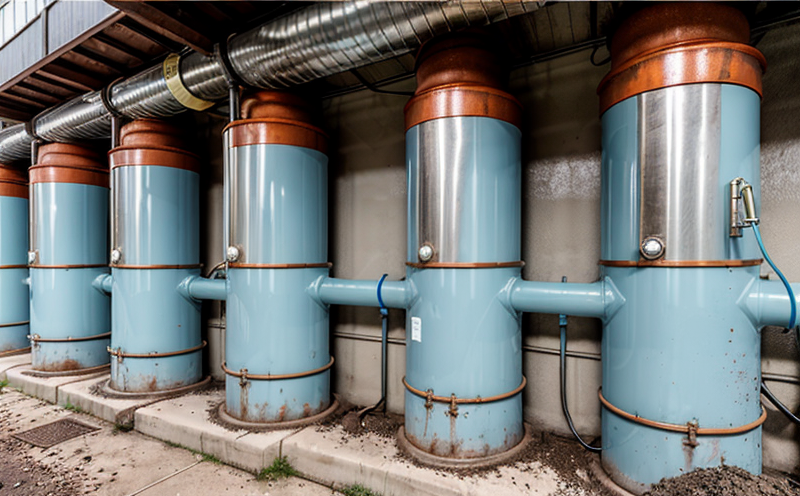ASTM D2680 Corrosion Product Analysis Test in Water
The ASTM D2680 test method is a cornerstone procedure utilized to assess and quantify corrosion products present in potable water systems. This testing service is crucial for ensuring the integrity of materials used in water distribution networks, helping to minimize the risk of metal release into drinking water. Understanding the composition and quantity of corrosion products allows stakeholders to identify potential issues early on and implement appropriate mitigation strategies.
This test serves as a vital tool for quality managers, compliance officers, R&D engineers, and procurement professionals tasked with maintaining high standards in water treatment facilities. By employing ASTM D2680, these individuals can effectively monitor the performance of materials under operational conditions, ensuring that they meet regulatory requirements and industry best practices.
The procedure involves several key steps: sampling, preparation of specimens, application to specific substrates, incubation period, and analysis. Each step is meticulously detailed within ASTM D2680, providing a robust framework for consistent results across different laboratories. This ensures that the test data can be trusted and used effectively in decision-making processes.
Understanding the composition and quantity of corrosion products generated during the test helps to identify potential sources of contamination, aiding in the selection of appropriate materials for use in water systems. This knowledge is particularly valuable when dealing with complex mixes of metals or alloys, as it allows for targeted approaches to prevent degradation and maintain system efficiency.
The ASTM D2680 method has been widely adopted by industries such as potable water treatment and distribution, industrial water systems, and facilities handling corrosive chemicals. Its application extends beyond just laboratory settings; field testing can also be conducted using this standard, providing real-time data on material performance in operational environments.
By leveraging ASTM D2680, organizations can enhance their understanding of how different materials behave under varying conditions, leading to more informed decisions regarding material selection and system design. This proactive approach not only improves the reliability and longevity of water treatment infrastructure but also contributes significantly towards public health protection by reducing the risk of metal contamination in drinking water supplies.
Scope and Methodology
| Scope | Description |
|---|---|
| Sampling | The process involves collecting representative samples from water systems to be tested. These samples should reflect the typical conditions under which materials will be exposed. |
| Preparation of Specimens | This step includes cleaning, cutting, or otherwise preparing specimens for testing according to ASTM D2680 guidelines. |
| Application to Substrates | The prepared specimens are then applied to specific substrates provided by the standard. |
| Incubation Period | A defined period of time during which the specimens remain in contact with water, allowing for corrosion product formation. |
| Analysis | The final step involves examining and quantifying any corrosion products formed on the specimen surfaces using appropriate analytical techniques. |
The ASTM D2680 procedure is designed to ensure that all these steps are followed rigorously, thereby producing reliable results that can be used confidently in various contexts. Compliance with this standard ensures consistency across different laboratories and facilities, facilitating effective communication of findings among stakeholders.
Industry Applications
- Potable water treatment plants
- Industrial water systems
- Facilities handling corrosive chemicals
- Hospitals and healthcare providers
- Agricultural operations
| Application | Description |
|---|---|
| Potable Water Treatment Plants | The ASTM D2680 test helps ensure that materials used in these plants do not contribute harmful amounts of metal ions to the drinking water supply. |
| Industrial Water Systems | This test is essential for assessing the compatibility between industrial processes and the materials employed, preventing potential disruptions due to corrosion issues. |
| Hospitals and Healthcare Providers | By minimizing metal contamination in water supplies, this testing method supports patient safety and compliance with healthcare regulations. |
| Agricultural Operations | The results from ASTM D2680 can inform the selection of materials used in irrigation systems to prevent contamination that could affect crop quality. |
These applications highlight the importance of ASTM D2680 in various sectors, emphasizing its role in maintaining high standards across different industries. The consistent application of this standard ensures reliable and repeatable results, which are crucial for effective decision-making processes within these organizations.
Quality and Reliability Assurance
The ASTM D2680 test method is recognized worldwide for its ability to consistently produce accurate results. Regular calibration of equipment and adherence to standardized procedures help maintain the integrity of each measurement taken during testing. This commitment to precision ensures that any discrepancies are identified promptly, allowing for corrective actions to be implemented immediately.
Laboratories performing ASTM D2680 tests must possess the necessary expertise and facilities to conduct these analyses correctly. Certification from recognized bodies further reinforces trust in the quality of results produced by such labs. Continuous training programs for personnel involved in executing this test contribute significantly towards maintaining high standards of reliability and accuracy.
Quality assurance measures also extend to ensuring that all reagents used meet specified purity levels, reducing variability introduced through impurities or degradation during storage. By implementing robust protocols at every stage of the testing process, laboratories can provide customers with confidence in the results obtained from ASTM D2680 tests.





